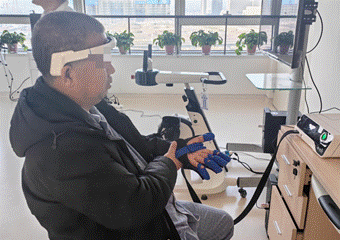On the afternoon of March 10, 2025, the Brain-Computer Interface (BCI) Hand Function Rehabilitation Training System was officially put into clinical use at the Department of Neurology of Land Port Division of the First Affiliated Hospital (FAH) of Xi'an Jiaotong University (XJTU), and the first patient successfully completed rehabilitation training using the system.
Developed by Zhentai Intelligent Technology, a company incubated by Professor Xu Guanghua's team from the School of Mechanical Engineering at XJTU, the system is based on the theory of "neuroplasticity". It decodes patients' movement intentions to activate damaged brain regions and establishes a closed-loop training system. Flexible electrodes accurately capture signals from the brain's motor cortex, which are then analyzed through algorithms to drive a bionic glove for precise movements. Simultaneously, VR scenarios provide multimodal feedback to strengthen the training loop.

The first patient, Mr. Ding (pseudonym), who suffered from limited muscle strength in his left upper limb due to a stroke, completed an engaging hand function training session using the BCI system under the guidance of the medical team, including Director of the Department of Neurology Cao Hongmei, attending physician Shang Suhang, and chief head nurse Qu Yan. During the training, Mr. Ding triggered brain signals through mental effort to drive the glove's movements, achieving the expected goals. Mr. Ding found the training enjoyable and expressed increased confidence in his recovery. Director Cao Hongmei emphasized that BCI technology transforms patients from passive recipients to active participants, highlighting the importance of psychological motivation in functional recovery. Dr. Shang Suhang noted that the system's engaging design helps alleviate anxiety, while its multimodal feedback enhances neural remodeling, surpassing the capabilities of traditional therapies.
The application of this system marks a new era of "BCI + smart healthcare" in neurological rehabilitation at the FAH of XJTU, offering innovative solutions for patients recovering from strokes, spinal cord injuries, and other conditions. Traditional hand function rehabilitation often faces challenges such as low patient engagement. This system, leveraging BCI technology, combines three core advantages, i.e. rapid response to brain signals, high-accuracy real-time decoding, and VR-based scenarios, to activate the motor cortex, forming a bidirectional closed-loop training system that significantly improves rehabilitation efficiency.
